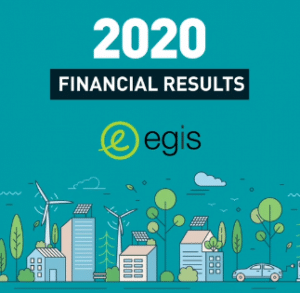
Egis awarded a 2-year extension for the operation and maintainance of tunnels and traffic control centre in Ireland
September 2, 2021
Egis and Fulton Hogan awarded operation & maintenance services for Stage 3 of Australia’s largest road infrastructure project, WestConnex
September 16, 2021
Solid fundamentals, a promising outlook and a new strategic plan

PARIS - In 2020, amid an environment affected by the Covid-19 public health and economic crisis, Egis demonstrated the solidity of its operational and commercial fundamentals with an order intake up by 5% and a decline of barely 5% in turnover. With its new strategic plan Impact the Future, the Group is now in a strong position to accompany the upturn in economic activity, the deployment of stimulus and recovery plans in France and around the world, and the transition to a low carbon future.
“I would like to take this opportunity to thank the 16,000 employees of the Group for their huge commitment throughout 2020 and their continued hard work today. Thanks to them, to the diversity of our markets and to our widespread geographical footprint, we have managed to limit the impact of the crisis on our Group, and our ambition thus remains intact: to become, within the next five years, one of the top 10 global Construction engineering firms by harnessing our technical excellence for the benefit of a transition to a low carbon future. This is the aim of our new strategic plan Impact the Future.” Laurent Germain, Chief Executive Officer.
Results for the 2020 financial year
An exceptional order intake, up by 5% compared with 2019, amounting to €927 million, drivenin particular by major contracts exceeding €10 million.
Turnover of €1.07 billion, down 5% en 2019: the severe impact of the crisis on our airport operation activities was counterbalanced by the excellent resilience of the other activities in the Group, and even growth in some geographical zones such as the Middle East and Latin America. 62% of our turnover is generated outside France.
€119 million euros EBITDA, after adjustment, representing an operating margin of 11%, which reflects the rapid adaptation of the Group’s operations to the pandemic.
Net profit, Group share, of €27 million
A limited impact of the Covid crisis on headcount, with, in certain markets, continued recruitment: 1400 new hires in 2020.
Solid fundamentals
Egis can count on the continued support of its clients and the buoyancy of its markets: the order intake in 2020 stood at an exceptional €927 million (+5% compared with 2019), bringing the order book at 31 December 2020 to a record level of €1,224 million, the equivalent of 18 months of consolidated turnover for engineering.
The group’s turnover amounted to €1.07 billion in 2020, which is a drop of 5% compared with 2019, of which 4.7% of organic negative growth, with perimeter effects counterbalanced by a negative foreign exchange impact.
Amid a major public health and economic crisis, Egis proved the solidity of its fundamentals: the drop in activity of its Aviation (-13%) and Consulting (-10%) Business Units (BU) in engineering was made up for by the resistance of its Major Structures, Water, Energy, Environment (only -1%), and Cities, Roads and Mobility (unchanged) BUs and the vitality of its Buildings BU (+1%). Moreover, the Middle East and Latin America zones recorded high growth of +9% and +8% respectively.
The Group won contracts for several iconic projects in 2020: a large contract amendment for the project management and supervision of the construction of Riyadh metro and the design of Amaala airport, both in Saudi Arabia, feasibility studies for Belgrade metro in Serbia, the EPC management of the Charles III real estate development block in Monaco, project management consultancy for the construction of Lima and Cusco hospitals in Peru, and the EPC management of the five main locks on the Seine-Nord Europe Canal.
An ambition intact, and a new strategic plan, Impact the Future
Egis’s performance in 2020 is an encouraging boost to the firm in its ambition to become one of the top 10 global construction engineering firms. The group is ready and prepared to accompany the upturn in economic activity, in particular in sectors that are structurally dependent upon the end of the public health crisis such as aviation, but Egis is also extremely well-placed to support the deployment of stimulus and recovery plans and the transition to a low carbon future.
As an acknowledged expert in smart and environmentally friendly infrastructure and buildings, Egis’s goal is to harness its technical excellence for the benefit of the transition to a low carbon future. The strategic plan Impact the future has been designed to double the group’s turnover in the space of five years and attain carbon neutrality in 2050. The energy transition becomes the third pillar of the group, alongside sustainable cities and transportation, with all of these seeking to promote smart urbanisation. To achieve this, the firm can rely on an acceleration in its most successful markets - rail and buildings – and on integrating the chain of expertise and reinforcing its technical and digital excellence to expand into and create new markets.
A promising outlook for 2021
The forecasts for 2021 are in line with Egis’ ambition. The group expects to see an upturn in its business, with turnover reaching the same heights as in 2019. In addition to its exceptional order intake of €927 million in 2020, the outlook for growth is promising in sectors which are strategic for the group such as rail and buildings, and in fast developing geographical zones such as the Middle East and Asia.
Furthermore, the group is continuing to pursue its external growth momentum. Several acquisitions have been made in recent months: the first of them a leisure and travel consultancy, Voltere by Egis, the second, the railway signalling works company Est Signalisation, and thirdly a company specialising in the delivery of railway projects in the United Kingdom, CPMS.
Several more acquisitions are planned in 2021, with the same ambition of rounding out the group’s activities and reinforcing its footing in several geographical zones. This dynamic external growth policy will help the group to reach critical mass in its various markets and effectively rise to the
major challenges of the times: improving the quality of life of the population, optimising mobility in an increasingly
complex world and actively contributing to the protection of the environment.

Chief Public Affairs and Corporate Communication Officer
Tel: +33 (0)1 39 41 44 17 / +33 (0)6 17 10 29 70
Email: isabelle.bourguet-mayrand@egis.frv
Deputy Communications Director
Tel: +33 (0)1 39 41 43 05 / +33 (0)6 25 33 02 64
Email: sabine.mendy@egis.fr

